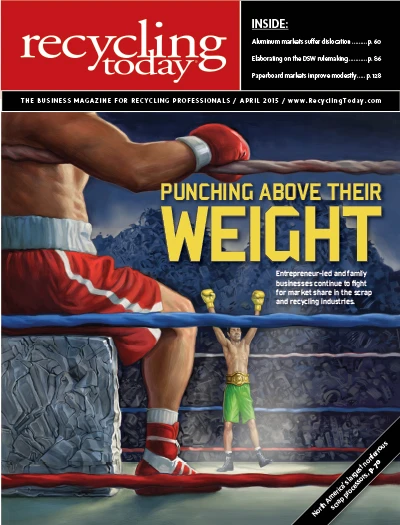Approximately 1,600 individuals registered for the Plastics Recycling Conference hosted by Resource Recycling Feb. 23-25 in Dallas, but weather-related travel issues kept some attendees from arriving in time to catch the first plenary session, “The View from the Top,” Feb. 24 beginning at 8:30 a.m.
Keefe Harrison of the Curbside Value Partnership moderated this session, which featured representatives from trade associations for the plastics and recycling industries:
- Steve Russell with the plastics department of the American Chemistry Council;
- Kim Homes of the SPI: The Plastics Industry Trade Association;
- Steve Alexander of the Association of Postconsumer Plastics Recyclers; and
- Robin Weiner of the Institute of Scrap Recycling Industries.
Harrison began the discussion by asking the panelists to describe what the industry has done well. Alexander said Operation Green Fence, in which China began cracking down on the quality of imported scrap shipments, “helped us to focus on keeping quality material in North America” and led to secondary sorting developments.
In addition to sorting technology developments, Weiner said Operation Green Fence helped to get rid of bad players, which she added pose a challenge across the recycling industry, particularly when demand is quite strong.
She also said the U.S. Environmental Protection Agency’s (EPA’s) move to allow the recycling of plastics from ASR (automotive shredder residue) was a major win for the industry. “Investment is occurring, and we will hear about new opportunities in the U.S. to recycle this material in the coming months and years.”
Russell said that recent developments have given him hope in terms of how the various factions of the industry work together to improve plastics recycling.
The panelists also identified ways that plastics recycling could be improved, with Russell noting that terminology remained an issue as did lack of awareness among consumers regarding recycling opportunities. He also said the plastics industry needed an organized way to speak out against false allegations made by recycling deniers.
Weiner and Alexander agreed that lacking a common language was a critical issue.
Holmes said plastics used outside of packaging needed to be considered, citing the HPRC (Healthcare Plastics Recycling Council) partnership to look at recycling prepatient plastics.
She added that it was important to understand true future demand for recycled plastics so recyclers had the confidence to make investments in their businesses. Holmes added that plastic products continue to grow in terms of market share, having increased 13 percent in 2013, while paper declined by 8 percent.

Weiner mentioned the need to address more complex material streams to increase the overall plastics recovery rate.
When it comes to policy, Alexander said he preferred to see the industry take the lead, adding, “Industry-led efforts are more efficient.”
Regarding “single-use” plastic bag bans, Holmes said they don’t address the real needs of communities, which would require comprehensive solid waste management plans.
Get curated news on YOUR industry.
Enter your email to receive our newsletters.
Explore the April 2015 Issue
Check out more from this issue and find your next story to read.
Latest from Recycling Today
- Ferrous price hikes may be poised to pause
- BIR prepares for Spanish exhibition
- Copper exempted from latest round of tariffs
- Interchange Recycling's EPR stewardship plan approved in Yukon
- Making the case for polycoated paper recovery
- Novolex, Pactiv Evergreen finalize merger
- In memoriam: Danny Rifkin
- BIR adds to communications team





